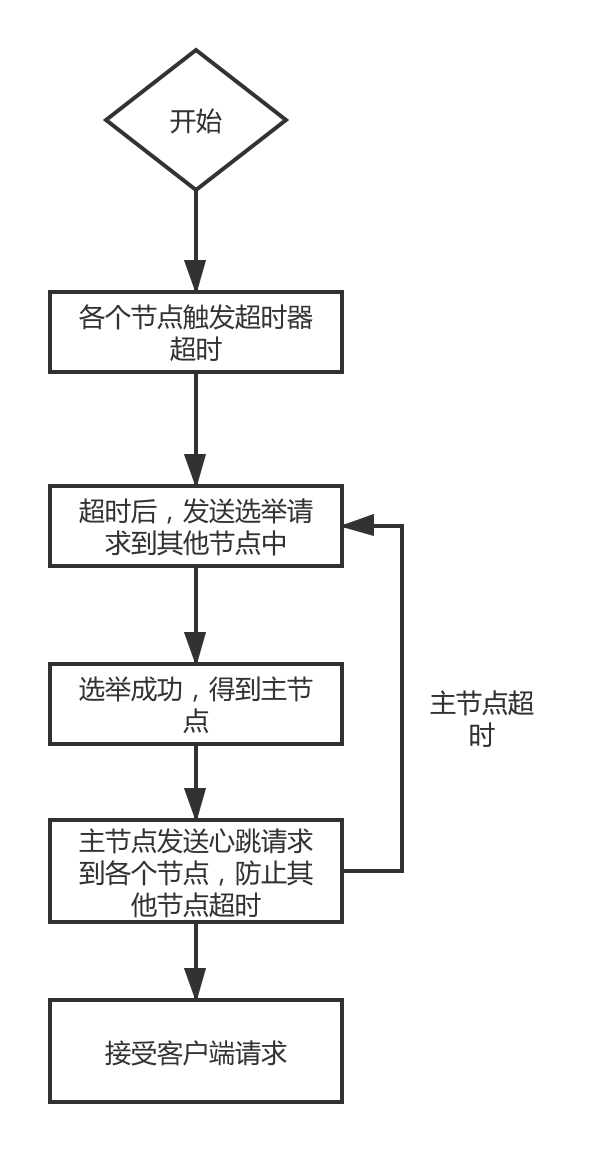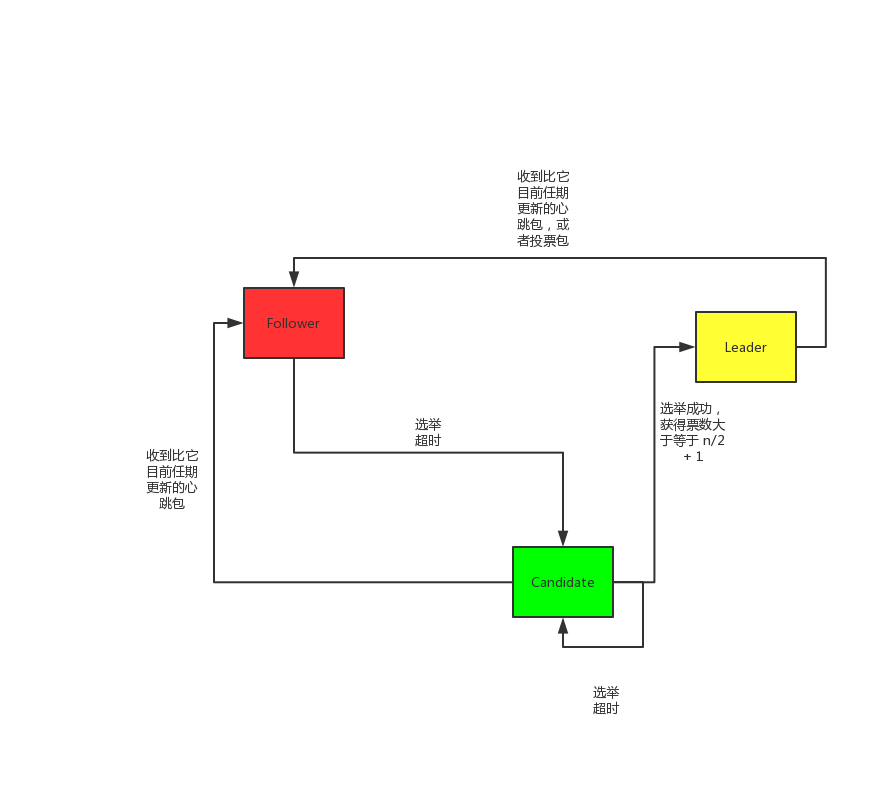Raft论文阅读 实现细节 2.1 [Raft整体流程](#2.1)
2.2 [Raft状态机维护](#2.2)
2.3 [Raft代码实现](#2.3)
论文各个章节主要解析
总体介绍,解析创造Raft的原因,并且简单描述Raft与Paxos的不同点
简单介绍一下副本状态机这个概念
简单描述Paxos的问题(包括了不好理解以及工业化上面的问题)
阐述Raft为什么比Paxos好理解
Raft的算法的详细描述以及边界条件
Raft集群出现成员变动的时候如何处理
Raft的日志压缩和快照
Client与Raft集群的交互方式
实现的时候,重点要看Figure2中所提及的条件。
此处只是一个比较简单的忽略具体可能出现错误细节的描述。
此处是一个简单状态机的描述,具体转换的原因也已经在图上面有标出来。
代码实现在这个Lab中实际上分为了3part
PartA 完成选举
PartB 完成日志
PartC 完成持久化的工作,并且处理共识的边界条件
跟随论文中提及的RequestVote RPC 以及 AppendEntries RPC 实现即可
一个注意的点,发送这两个RPC的时候,都是需要并行发送的,因此每个请求需要使用一个GoRoutine去进行实现。
1 2 3 4 5 6 7 8 9 10 11 12 13 14 15 16 17 18 19 20 21 22 23 24 25 26 27 28 29 30 31 32 33 34 35 36 37 38 39 40 41 42 43 44 45 46 47 logs := make([]Log, 0) tmpIndex := min(max(0, rf.nextIndex[number]-1), rf.logs[rf.getLen()].Index) if tmpIndex < rf.logs[rf.getLen()].Index { logs = rf.logs[tmpIndex+1-firstIndex:] //DPrintf("server %d is Leader, tmpIndex is %d, firstIndex is %d, len of log is %d, commited index is %d", // rf.me, tmpIndex, firstIndex, len(rf.logs), rf.commitedIndex) } args := AppendEntriesArgs{Term: rf.currentTerm, LeaderId: rf.me, PrevLogTerm: rf.logs[tmpIndex-firstIndex].Term, PrevLogIndex: tmpIndex, Entries: logs, Leadercommited: rf.commitedIndex} // 使用Goroutine来发送请求 go func(args AppendEntriesArgs, number int) { reply := AppendEntriesReply{} ok := rf.sendAppendEntires(number, &args, &reply) rf.mu.Lock() defer rf.mu.Unlock() if !ok { DPrintf("allAppendEntries server %d call remote %d rpc AppendEntries failed", rf.me, number) } if args.Term != rf.currentTerm { return } if reply.Term > rf.currentTerm { //rf.mu.Lock() rf.state = Follower rf.currentTerm = reply.Term // TODO why Term voliate needed to persist? rf.persist() //rf.mu.Unlock() return } if reply.Success == true && rf.state == Leader { if len(args.Entries) > 0 { rf.nextIndex[number] = args.Entries[len(args.Entries)-1].Index + 1 rf.matchIndex[number] = rf.nextIndex[number] - 1 if rf.matchIndex[number] > rf.commitedIndex { rf.updateCommit() } } } else if rf.state == Leader { if rf.nextIndex[number] > reply.PrevIndex+1 { rf.nextIndex[number] = reply.PrevIndex + 1 } else { rf.nextIndex[number] = max(rf.nextIndex[number]-1, 1) } } }(args, number)
并且注意实现的时候的锁的使用,保证每次使用锁都有加锁和解锁的操作成对出现,否则可能会出现一些比较奇怪的情况。
此处需要接受模拟从客户端的请求进来然后把Log先放到本地的Log上面,然后把Log同步到其他的节点上面去进行共识的达成。
首先的条件,需要确保Start函数接受请求的时候必须是Leader的角色,否则不会接收请求。(论文中有提及,此处Raft集群中非Leader节点不会把日志写入的请求转发到Leader节点上,这个是为了维护的方便来做的)
1 2 3 4 5 6 7 8 9 10 11 12 13 14 15 16 17 18 19 20 21 func (rf *Raft) Start(command interface{}) (int, int, bool) { index := -1 term := -1 isLeader := true // Wanring: do not double add lock for GetState function rf.mu.Lock() defer rf.mu.Unlock() term, isLeader = rf.GetState() if isLeader { index = rf.logs[rf.getLen()].Index + 1 //oldLogLen := len(rf.logs) rf.logs = append(rf.logs, Log{command, term, index}) //DPrintf("server %d is Leader. new log has been appended, old length is %d, now is %d. index number is %d, commitedindex is %d", // rf.me, oldLogLen, len(rf.logs), index, rf.commitedIndex) if len(rf.chanNewLog) == 0 { rf.chanNewLog <- 1 } rf.persist() } return index, term, isLeader }
重点处理的地方是nextIndex和MatchIndex 的计算以及维护的问题
因为对于外部客户端的行为来说,Start函数是一个异步的函数, 所以实际上客户端是通过等待Make函数中输入的ApplyCh来确定能够apply成功,保证对外的原子性
1 2 3 4 5 6 7 8 9 10 11 12 13 14 15 16 17 18 19 20 21 22 23 24 25 26 27 28 29 30 31 32 33 34 35 func (rf *Raft) doApply() { for { rf.mu.Lock() st := rf.state rf.mu.Unlock() if st == Killed { return } select { case <-rf.chanCommit: for { rf.mu.Lock() if !(rf.lastApplied < rf.commitedIndex && rf.lastApplied < rf.logs[rf.getLen()].Index) { rf.mu.Unlock() break } FirstIndex := rf.logs[0].Index if rf.lastApplied+1 >= FirstIndex { index := min(rf.lastApplied+1-FirstIndex, rf.getLen()) msg := ApplyMsg{CommandValid: true, Command: rf.logs[index].Command, CommandIndex: rf.lastApplied + 1} rf.lastApplied++ rf.mu.Unlock() //can't lock when send in channel, dead lock // canApplychan is to block the new rf.chanCanApply <- 1 rf.chanApplyMsg <- msg <-rf.chanCanApply rf.mu.Lock() } rf.mu.Unlock() } } } }
此处首先需要添加状态机的持久化的方法,并且需要在启动的时候添加一个读取旧的持久化状态机的方法。
1 2 3 4 5 6 7 8 9 10 11 12 13 14 15 16 17 18 19 20 21 22 23 24 25 26 27 28 29 30 31 32 33 34 35 36 37 38 39 40 41 42 43 44 func (rf *Raft) InstallSnapshot(args *InstallSnapshotArgs, reply *InstallSnapshotReply) { rf.chanCanApply <- 1 rf.mu.Lock() reply.Success = false persistFlag := 0 if args.Term < rf.currentTerm { reply.Term = rf.currentTerm rf.mu.Unlock() <-rf.chanCanApply return } if rf.currentTerm < args.Term { rf.currentTerm = args.Term rf.ClearChan() rf.voteFor = -1 rf.state = Follower persistFlag = 1 } reply.Term = rf.currentTerm // similar to appendEntries receive call rf.chanAppendEntries <- 1 firstIndex := rf.logs[0].Index nowIndex := args.LastIncludeIndex - firstIndex if nowIndex < 0 { if persistFlag == 1 { rf.persist() } reply.PrevIndex = firstIndex rf.mu.Unlock() <-rf.chanCanApply return } rf.logs = args.Logs rf.lastApplied = args.LastIncludeIndex rf.commitedIndex = args.LeaderCommitIndex rf.persister.SaveStateAndSnapshot(rf.getPersistByte(), args.Snapshot) msg := ApplyMsg{CommandValid: false, Snapshot: args.Snapshot} rf.mu.Unlock() rf.chanApplyMsg <- msg <-rf.chanCanApply reply.Success = true }
1 2 // 启动的时候添加这个方法把Snapshotload出来 rf.readPersist(persister.ReadRaftState())
并且需要注意在投票部分需要根据Safty那里提及的一个重要的地方,如果RequestVote RPC里面的日志Term与目前的Term不是一致的情况下,不能通过数票数的方法来进行计算。这个是为了整个集群的正确来考虑的。
1 2 3 4 5 6 7 8 9 10 11 12 13 14 15 16 17 18 19 20 21 22 23 24 25 26 27 func (rf *Raft) updateCommit() { N := rf.commitedIndex FirstIndex := rf.logs[0].Index for i := max(rf.commitedIndex+1, FirstIndex+1); i <= rf.logs[rf.getLen()].Index; i++ { num := 1 for j := range rf.peers { if j != rf.me { if rf.matchIndex[j] >= i { /* this part is paper 5.4.2 limit, only can count replicate when log's term is equals to currentTerm */ if rf.logs[i-FirstIndex].Term == rf.currentTerm { num++ } } } } if num > len(rf.peers)/2 { N = i } } if N > rf.commitedIndex && rf.state == Leader { rf.commitedIndex = min(N, rf.logs[rf.getLen()].Index) rf.chanCommit <- 1 } }

